The arrival of vaccines and priority inoculation drives have given us hope that the worst of the pandemic might be behind us.
However, thinking of the pandemic really being over with the vaccine is not just far-fetched, but the spread of new mutations and variants have added to worries- they are much more infectious, deadly and most of all, we do not have much information about ways to prevent them.
So, would a vaccine work to fight the new COVID-19 strains? Here’s what you need to know right now.
readmore
02/8How many new COVID mutations are presently active?
Viruses, and any germ, in particular, are known to mutate often during their life cycle.
However, the way COVID-19 strains continue to spread has alarmed scientists and epidemiologists worldwide. So much so, a single new variant has surged cases across the UK badly, imposed fresh lockdowns, restrictions and is slowly starting to impact other countries worldwide.
Of all, three COVID variants, in particular, carry the most risks- ones which have emerged from Kent, UK ( B.1.1.7 variant), South Africa (B.1.351 variant) and Brazil (B.1.1.28.1 or P.1 variant).
If experts and the case studies are to be believed, all of these variants are quite hazardous and could spread way more easily than others. Preliminary findings, yet to be peer-reviewed suggest that the UK variant is 56% more infectious and contagious.
readmore
03/8How does the discovery of the new mutations impact vaccines?
Vaccines work by training the immune system to recognize and evade any infectious pathogen from a future attack. In short, they work to prevent the virus’s entry into the body or causing damage.
While most vaccines are devised to work under a host of conditions (hence, the long timeline), some vaccines also require an upgrade or additions to be more workable against the germ. Take the flu vaccine for example. Every year, as strains of influenza virus, are discovered, flu vaccine shots are often tweaked, or offer additional defences to prevent a person from getting sick. The same exists for many other vaccines too.
However, the problem arises with the COVID vaccines, which have been developed not just in an experimental fashion but, faster-than-ever timeline.
readmore
04/8Do vaccines work against all variants?
Not only is COVID a recently evolved problem, we are still delving to learn more about, but vaccines being used right now are also largely experimental.
Most vaccines which are being used right now were also being developed at a time these contagious mutations (especially the UK and South Africa one) weren’t of importance.
However, according to CDC guidelines, most vaccines right now will be able to suffice ample protection against ALL variants of COVID-19. But, do remember, this piece of information is still being researched, and since it’s a relatively new virus, we do not have concrete proof to prove the claim right. Therefore, while it is scary to hear, it may be too early to predict what COVID vaccines can, and cannot protect against.
readmore
05/8Will the vaccines be any less effective?
Higher the efficacy and workability of a vaccine, higher the protection we get.
While a lot of information is still being reviewed, some experts do believe that vaccines may be able to protect against the host virus, but maybe less effective than the promised rate.
readmore
06/8Which of the current vaccines will be more suitable?
As more information is being reviewed, different vaccine makers have done clinical studies and research to determine whether or not their model is safe for use.
Pfizer-BionTech, being used largely in the UK and the US published preliminary studies suggesting that its vaccine works greatly against both variants- the UK Kent one, and the South African one.
Moderna, too, maybe a good bet. Early studies, which are yet to be peer-reviewed mention that although the vaccine would be largely able to protect against the virus, it may be a tad bit less effective.
Closer home, where domestic vaccine shots, Covaxin and Covishield are being used, case of the new COVID variants are rising slowly. However, Hyderabad based Bharat Biotech released promising information which said that their vaccine works against the variant. Covaxin, still in a clinical study was found to be fully effective against the mutation. Scientists evaluated the vaccine’s mechanism by conducting a plaque reduction neutralization test against the genome sequencing of the UK variant.
readmore
07/8Should you still get a vaccine shot?
Presence of mutations shouldn’t be a reason for you to not get vaccinated.
Vaccination is one of the best ways to safeguard protection against the virus, which has caused over 10 million fatalities and a lot more casualties. It’s also a ‘safer’ and a reassuring way to resume life in a normal manner, albeit with some precautions.
Even if you are sceptical about the vaccines’ effectiveness, do remember that preventive methods will be strong enough to slow down the spread of the virus, and if anything, boost the chances of the infection not getting to you.
Getting vaccinated will also protect the ones around you- those may not be able to get vaccinated but are at a higher risk of catching novel coronavirus-old or the new.
readmore
08/8What should you do to keep yourself protected?
Even if the active cases are going down and vaccination rates increasing, this is no time for us to be lax.
A mutant virus which is said to be more contagious, and likely to increase mortality rate means that we should be brushing our guard and practising more precaution than usual.
Wear a mask that fits you well, wash and sanitize hands regularly, maintain ample distance, limit exposure if possible. Most of all, get vaccinated when you do get a chance. These are, and will remain to be the most preventive strategies to slow down the transmission, contagion rate of the virus at large.
readmore
read the full story about Do COVID-19 vaccines work against new mutations?
#theheadlines #breakingnews #headlinenews #newstoday #latestnews #aajtak #ndtv #timesofindia #indiannews




